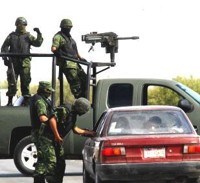In response to concerns about cartel involvement, the Mexican military was placed in control of the policing and administrative functions of a major port city in the state of Michoacan earlier this month. In an email interview, Stephen Morris, professor and chair of the political science department at Middle Tennessee University who researches political corruption in Mexico, explained corruption in Mexico’s military.
WPR: How affected is the Mexican military by corruption compared to other institutions such as the police?
Stephen Morris: Generally, the Mexican military is considered to be less corrupt than other governmental institutions in Mexico, particularly the police. This has long been reflected in studies that attempt to gauge the level of corruption in Mexico. Such studies, of course, are based largely on perception and may reflect, in part at least, the public’s limited interactions with the military and the greater level of opacity within the military. This does not mean that the military has been free from repeated accusations of corruption, largely involving the trafficking of drugs and the protection of narcotrafficking organizations, yet as with most cases in Mexico, few officials have ever been prosecuted for such crimes. Many remember the dramatic arrest and prosecution of Gen. Jesus Gutierrez Rebollo in the late-1990s and the drama surrounding the prosecution and subsequent reversal in the case against high-level military officers, including Gen. Tomas Angeles Dauahare, earlier this year. Such high-level cases arguably represent the tip of the iceberg of soldiers and officers engaged in smuggling operations along the border or protection of narcotraffickers, and former soldiers filling the ranks of the drug organizations.

